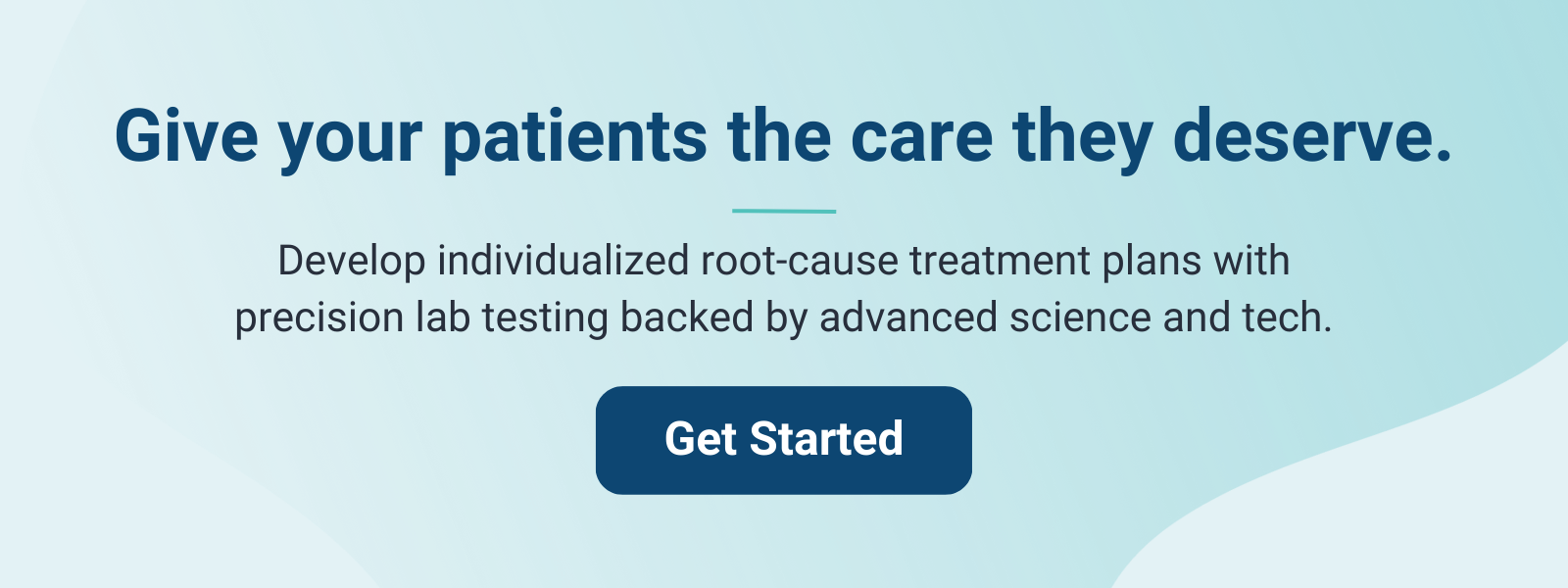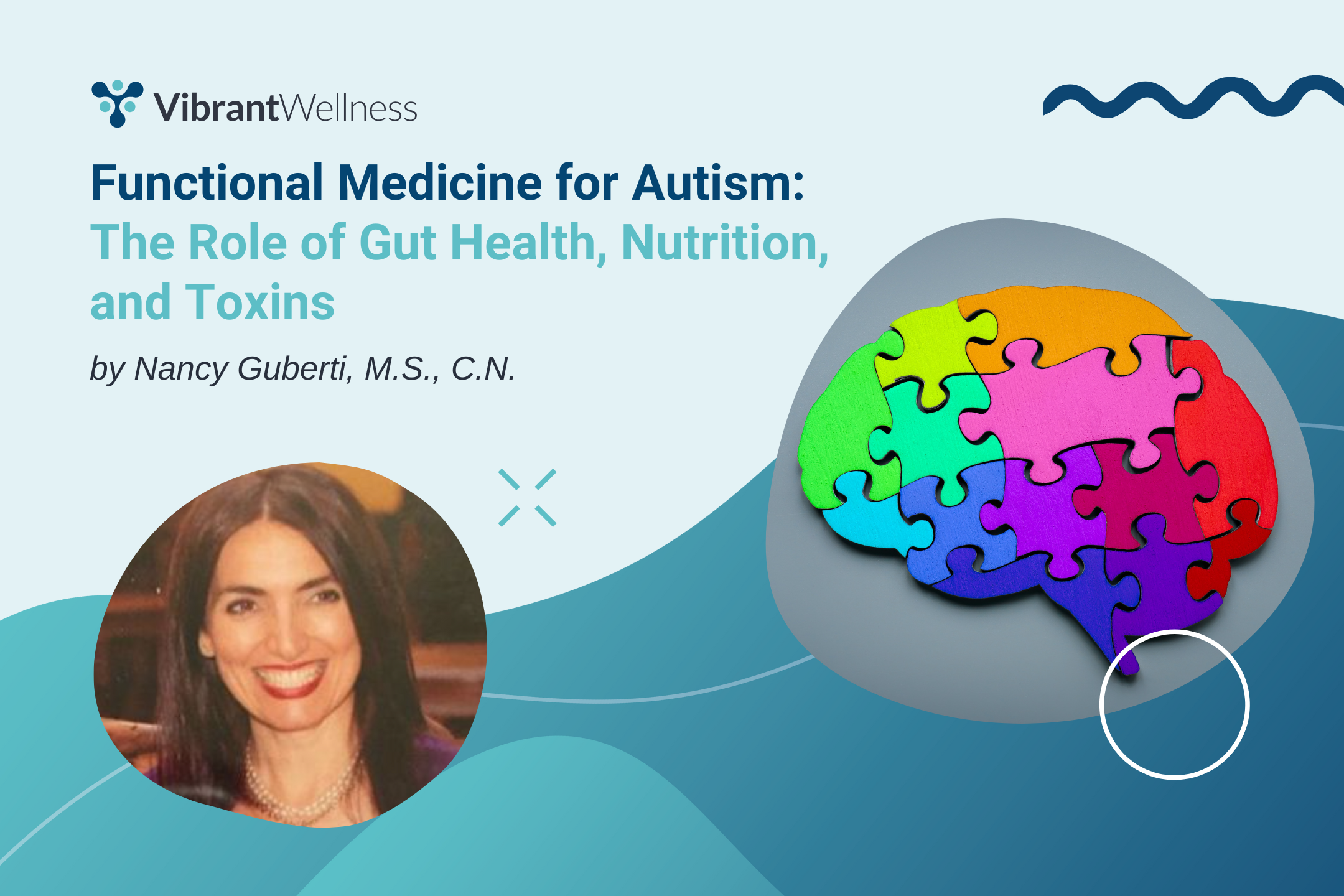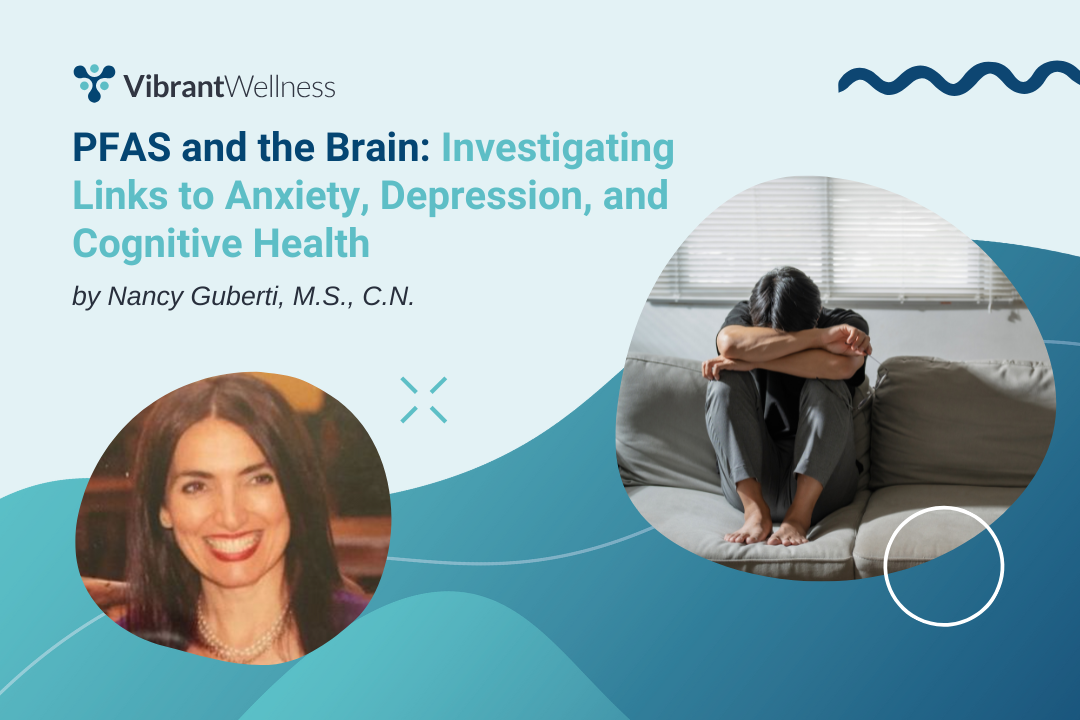Understanding the Gut and Mental Health Connection
The gut and brain connection is scientifically proven to have bi-directional messaging across the "gut-brain axis," which is the network of nerves and hormonal and neural signals that connect the brain and the gastrointestinal (GI) tract.1 The gut affects the brain, and the brain affects the gut. The health of your gut can significantly impact your mental health.2

The gastrointestinal tract is sensitive to emotions such as sadness, anxiety, and joy, as these feelings can influence symptoms in the gut. The brain directly impacts the stomach and intestines, so gut issues can send signals to the brain, just as brain issues can send signals to the gut.
It then becomes easier to understand why you might feel intestinal pain during times of stress, nausea before giving a presentation, or an upset stomach during an interview. These conditions are not all in your head. Instead, this is where psychology combines physical factors to cause pain and other bowel symptoms.
Psychosocial factors can impact gut physiology, affecting movements and contractions within the gastrointestinal tract, particularly during stress, depression, or emotional strain.18
When treating clients, addressing the gut and brain connection can benefit their total wellness because it affects many aspects of health, including mental health, digestive issues, and neurological disorders.

In this article, we will explore the delicate signaling between the gut and brain and its impact on mental health, the signs and symptoms of an imbalance between the two systems, the gut microbiome's role, inflammation, and the vagus nerve. You'll gain an understanding of the specialized lab testing options and proactive wellness interventions to optimize your client's health journey.
Table of Contents
Warning Signs and Symptoms of Gut-Brain Axis Issues
.png?width=800&height=300&name=2024-BlogImages%20(1).png)
An imbalance of beneficial and opportunistic bacteria and an inflamed gut can produce symptoms in clients as a brain-gut axis issue. Gut microbiota produces and regulates certain neurotransmitters, such as dopamine, serotonin, and glutamate, all of which play roles in neurological activities in the brain.
Mental and gut disorders influence clients' studies, work, and everyday life. In 2019, the number of people suffering from mental disorders was 970 million.5 Globally, in 2019, 38.4% of prevalent diseases had digestive causes, representing 2.9 billion cases.6
Symptoms to Look for:
- Digestive Issues: Chronic bloating, abdominal distention (swollen belly), constipation, diarrhea, and food intolerances.
- Mood Changes: Persistent anxiety, irritability, or low mood without any clear triggers.
- Social Isolation: Avoiding social gatherings for fear of experiencing GI distress and overwhelm.
- Cognitive Symptoms: Brain fog, poor concentration, and memory difficulties.
- Sleep Disruption: Difficulty falling or staying asleep, especially when accompanied by digestive complaints.
The Microbiome's Role in Mental Health
.png?width=800&height=300&name=2024-BlogImages%20(2).png)
The gut microbiome plays a vital role in mental health as some gut microbiota are associated with mental health disorders, such as anxiety, autism spectrum disorder (ASD), depression, bipolar disorder, schizophrenia, and eating disorders.7 In particular, the gut microbiota named Firmicutes and Bacteroidetes have been demonstrated to affect mental health and are markers in the Gut Zoomer lab test.
Gut microbiota dysbiosis promotes the occurrence and progression of mental disorders. Studies indicate that people with depression often exhibit lower levels of beneficial gut bacteria.3 Focusing on the gut microbiome offers an effective method to be proactive with mental health treatments.
Checking for toxins such as glyphosate—a common herbicide that can disrupt the gut microbiome and affect serotonin production—is also beneficial. Research suggests that about 90% of serotonin, a neurotransmitter linked to mood, is produced in the gut. Therefore, the disruption of gut health can impact mental health, with studies showing that those with digestive disorders are more likely to experience mood disorders.4,8

The Gut-Mind Connection in Clinical Practice
Have you noticed a link between an imbalanced gut microbiome, gastrointestinal distress such as bloating, constipation, diarrhea, heartburn, nausea, reflux, stomach pain, or irritable bowel syndrome (IBS), and mental health disorders with your clients? Edward Blanchard, PhD, a professor of psychology at the State University of New York at Albany, believes 60% of IBS patients will meet the criteria for one or more psychiatric disorders. Another 20% of patients have depression, and the rest have other mental health disorders.
A study investigating the prevalence of co-morbid psychiatric disorders in patients with IBS found that 84.4% of individuals with IBS also experienced psychiatric conditions, including generalized anxiety disorder and depression, compared to 41.5% in the control group.17 Individuals with tumors in their digestive system had the highest rate of depression at 57.55%.9
How Inflammation Drives Mental Health Challenges
.png?width=800&height=300&name=2024-BlogImages%20(11).png)
Inflammation has emerged as a key factor in illness, particularly within the gut, where it can trigger systemic inflammation that influences brain health. The gut-brain connection is mediated by several pathways, including the production of peptides and short-chain fatty acids (SCFAs) by certain gut bacteria. These molecules have the potential to affect gene expression and inflammation within the central nervous system.8
In my clinical experience, I’ve observed elevated levels of inflammatory markers, such as C-reactive protein (CRP), in individuals with mood disorders, manic behavior, and bipolar disorder. This suggests that systemic inflammation may play a significant role in the etiology of certain mental health conditions.
The Role of Leaky Gut in Systemic Inflammation
One possible mechanism linking gut health and mental health is the concept of “leaky gut,” which was once a controversial term but is now gaining scientific recognition.
 The hypothesis posits that gut inflammation increases intestinal permeability, allowing toxins and microbial byproducts to enter the bloodstream. This breach can activate the immune system, triggering an inflammatory cascade that may contribute to mental health disorders.
The hypothesis posits that gut inflammation increases intestinal permeability, allowing toxins and microbial byproducts to enter the bloodstream. This breach can activate the immune system, triggering an inflammatory cascade that may contribute to mental health disorders.
Further research has identified a strong correlation between leaky gut and several pathophysiological states, including irritable bowel syndrome (IBS), inflammatory bowel disease (IBD), celiac disease, multiple sclerosis, type 1 diabetes, rheumatoid arthritis, obesity, non-alcoholic fatty liver disease (NAFLD), and neurological disorders.10
These findings highlight how increased gut permeability not only impacts systemic inflammation but also has far-reaching implications for overall health, including mental well-being.
Strategies to Support Gut Health and Reduce Inflammation
Encouragingly, emerging studies from human trials demonstrate that specific nutrients and supplements can help maintain or restore the structure of the gut barrier. Beneficial bacteria such as probiotics and prebiotics can help restore the balance of gut microbiota and enhance barrier function. L-glutamine is an amino acid that is an essential building block for the intestinal lining and can improve gut barrier function; Zinc can help maintain the integrity of the gut barrier and lining.
This research provides valuable insights into dietary strategies that may support gut integrity and reduce systemic inflammation, offering a promising avenue for improving both physical and mental health.
The Role of the Vagus Nerve in the Gut-Brain Axis
.png?width=800&height=300&name=2024-BlogImages%20(3).png)
The vagus nerve, a component of the parasympathetic nervous system, is a critical communication pathway in the gut-brain axis, sending signals from the gut to the brain. The vagus nerve is responsible for many bodily functions, specifically for this discussion addressing mood control and digestion, immune response, and heart rate.
If the gut is inflamed, it can stimulate the vagus nerve to send stress messages, impacting mood. Additionally, the gut is the immune system's control center, and the vagus nerve has immunomodulatory functions, so this nerve plays a vital role in the relationship between the gut-brain and inflammation.
Gaining Insights with Specialized Lab Tests
The best approach to help a client is gaining insight into their functioning with specialized labs since they provide markers of one's gut-brain health, offering data to create customized and targeted interventions.
Assessing the Gut Microbiome
The Vibrant Gut Zoomer assesses gut microbiome composition, inflammation, immune response, and permeability. Key markers include butyrate (a short-chain fatty acid associated with mental resilience) and pathogenic bacteria that may contribute to mood disorders.
The Gut Zoomer provides a breakdown of one's beneficial bacteria ratios, which is very helpful in recommending the best probiotic for a client. The gut houses trillions of microbes, collectively called the microbiome, and certain bacteria, like Lactobacillus and Bifidobacterium, produce metabolites that can cross the blood-brain barrier and influence neurotransmitter production.
Detecting Neurological Inflammation & Autoimmune Reactions
The Neural Zoomer Plus detects markers associated with neurological inflammation and autoimmune reactions, which can impact mental health.
It also checks for antibodies against brain tissues, helping detect neuroinflammation that may lead to mood dysregulation, memory, and aging.
Measuring Neurotransmitters and Metabolites
The Neurotransmitters Panel analyzes key neurotransmitters, such as serotonin, dopamine, norepinephrine, and GABA, which are vital for mood and cognition.
It offers insights into the biochemical balance of the nervous system, identifying imbalances that may affect mental health. This information aids in creating personalized treatment plans to enhance neurological function and well-being.
Case Study: Addressing GI Distress and Anxiety

Dana, a 42-year-old corporate executive with a history of parasites, IBS, and anxiety, struggled with abdominal distention, inflammation on one side of her face when her GI issues intensified, stomaches, patterns of diarrhea and constipation, overwhelm, and intense anxiety.
Gut Zoomer testing revealed elevated calprotectin, indicating inflammation, in her intestines, undigested fibers indicative of inadequate chewing, pancreatic or bile insufficiency, elevated fecal zonulin, a marker of an impaired intestinal barrier, and reactions secondary to inflammation and low levels of Lactobacillus plantarum.
Neurotransmitter panel testing revealed low levels of serotonin, 5-HTP, and GABA.
Dietary changes helped significantly, including:
- Replacing raw vegetables with steamed
- Adding lean protein to each meal
- Taking targeted probiotics, slippery elm, glutamine, and digestive enzymes
Dana also added daily meditation and gentle cardio exercises. Within two months, her symptoms improved.
Case Study: Alleviating Bloating, GI Distress, and Depressed Mood

Joanne is a 64-year-old accountant with Epstein-Barr virus, weight loss struggles, Candida, digestion issues, a bloated belly, a depressed mood, and memory concerns.
Gut Zoomer testing revealed elevated calprotectin, indicating inflammation in her intestines, elevated pancreatic elastase 1, elevated long-chain fatty acids, elevated fecal zonulin, and low Lactobacillus.
Neural Zoomer Plus revealed elevated Epstein Barr Virus VCA gp125, Anti-Microglia, and Anti-Glutamate.
Neurotransmitter panel testing revealed low levels of serotonin.
Dietary changes were recommended to reduce sugar, gluten, dairy, and processed foods and replace them with balanced meals, including lean protein and vegetables and targeted probiotics, slippery elm, homeopathic neurotransmitters, and digestive enzymes. Joanne is working on stress management with meditation and a treadmill, and is consistently improving her gut health, memory, and mood.
Strategies to Improve the Gut-Brain Axis
Reaching total wellness of mind and body starts with improving mental health through gut health, which requires a multifaceted approach, incorporating diet, lifestyle, and supplementation.
Nutritional Interventions
-
Reduce Inflammatory Foods: Processed foods, gluten, wheat, sugar, alcohol, and trans fats promote gut inflammation, potentially worsening mental health symptoms.
-
Test for Food Sensitivities: Many clients prefer food sensitivities lab testing to guide dietary changes rather than strict elimination diets. The Food Zoomer panels provide an in-depth look into specific food sensitivities by examining immune responses to peptides within these specific antigenic foods, compared to other food sensitivity tests that measure antibodies to whole proteins. The combination of the food sensitivity panel, which assesses sensitivity to 209 common foods in the Western diet and food additives, along with the food zoomer, provides comprehensive insights to customize food plans for your clients. Depending on the test results and one’s symptoms, the recommendation will be a modified Mediterranean diet that is dairy-free, casein-free, gluten-free, wheat-free, and rich in anti-inflammatory foods like olive oil, fatty fish, and leafy greens.11
-
Increase Fiber Intake: A fiber-rich diet supports the growth of beneficial gut bacteria. Foods like organic, gluten-free oats, organic apples, and legumes can increase butyrate-producing bacteria, which impacts mood.
-
Add Fermented Foods: Fermented foods like organic coconut yogurt and kimchi contain live probiotics, supporting a healthy gut microbiome. Some people may not be able to handle these foods at the beginning, so introduce new foods slowly and suggest a daily journal of what they eat and drink, their stress levels, sleep patterns, mood, and GI issues to identify any patterns.
Supplements and Probiotic Interventions
- Slippery elm contains mucilage that soothes the mouth, intestines, stomach, and throat.
- Probiotics such as Lactobacillus rhamnosus and Bifidobacterium longum are beneficial in reducing symptoms of anxiety and depression.
- Digestive enzymes help the body process food and absorb nutrients.
- Glutamine supports the gut microbiome, reduces inflammation, supports the production of serotonin, and improves gut mucosal wall integrity.
- Vitamin D: Low levels are associated with depression and anxiety.12
Exercise for Gut and Brain Health
Exercise must be a component of one's life to reach optimal gut-brain health since exercise encourages beneficial gut bacteria growth and reduces inflammation. It also releases endorphins and promotes neurogenesis, enhancing mood and cognitive function. Exercises such as swimming, running, brisk walking, cycling, and yoga may positively impact gut microbial diversity are.13, 14, 15
Stress Reduction and Mindfulness
Incorporating lifestyle factors to help reduce stress is always recommended. Most clients will benefit from these mindful strategies to help manage stress, reduce inflammation, and support gut and mental health. Recommend lifestyle factors matching the client's personality and compliance level. Certain activities like yoga activate the vagus nerve.16
Stress reduction activities to explore include:
- Meditation
- Deep breathing
- Gentle stretching
- Tai chi
- Grounding
- Nature walking
- Gentle yoga
- Journaling
I recommend that clients try one stress reduction activity at a time and journal to discover which one suits them best. This helps them ascertain which one works best in different situations.
.png?width=800&height=300&name=2024-BlogImages%20(10).png)
The Bottom Line
There is a direct link between gut and mental health in bi-directional communication. Utilizing the Gut Zoomer, Neurotransmitter Panel, and Neural Zoomer Plus assists in recognizing and addressing gut-brain imbalances. The lab markers provide insight into how a person is functioning and where support is needed.
The goal for our clients is to achieve total wellness in gut and mental health. We focus on supporting the gut-brain axis with dietary plans, supplement protocols, and lifestyle interventions to manage stress and support a healthier gut.
It is exciting to utilize these specialized labs and gain insight into the markers of this intricate gut-brain relationship that holds the key to a happier and healthier life.
About the Author
Nancy Guberti, M.S., C.N., is a functional medicine practitioner, medical educator, and founder of Total Wellness Empowerment Institute, offering accredited courses for health coaching, special needs children, and practitioner mentorship. She specializes in empowering others to reach optimal wellness and success. She's been featured on Shape, SheKnows, WorldLifestyle, Associated Press, and Huffington Post. Her book, Healthy Living Every Day: Total Wellness For Mind & Body is available on Amazon. Connect with her on Instagram and LinkedIn.
References:
- Carabotti M, Scirocco A, Maselli MA, Severi C. The gut-brain axis: interactions between enteric microbiota, central and enteric nervous systems. Ann Gastroenterol. 2015;28(2):203-209. Available from: https://www.ncbi.nlm.nih.gov/pmc/articles/PMC4367209/
- Valles-Colomer M, Falony G, Darzi Y, et al. The neuroactive potential of the human gut microbiota in quality of life and depression. Nat Microbiol. 2019;4:623-632. doi:10.1038/s41564-018-0337-x
- Kelly JR, Borre Y, O'Brien C, et al. Transferring the blues: depression-associated gut microbiota induces neurobehavioural changes in the rat. J Psychiatr Res. 2016;82:109-118. doi:10.1016/j.jpsychires.2016.07.019
- Barandouzi ZA, Lee J, del Carmen Rosas M, et al. Associations of neurotransmitters and the gut microbiome with emotional distress in the mixed type of irritable bowel syndrome. Sci Rep. 2022;12:1648. doi:10.1038/s41598-022-05756-0
- GBD 2019 Mental Disorders Collaborators. Global, regional, and national burden of 12 mental disorders in 204 countries and territories, 1990-2019: a systematic analysis for the Global Burden of Disease Study 2019. Lancet Psychiatry. 2022;9(2):137-150. doi:10.1016/S2215-0366(21)00395-3
- Wang Y, Huang Y, Chase RC, et al. Global burden of digestive diseases: a systematic analysis of the Global Burden of Diseases Study, 1990 to 2019. Gastroenterology. 2023;165(3):773-783.e15. doi:10.1053/j.gastro.2023.05.050
- Xiong RG, Li J, Cheng J, et al. The role of gut microbiota in anxiety, depression, and other mental disorders, as well as the protective effects of dietary components. Nutrients. 2023;15(14):3258. doi:10.3390/nu15143258
- Yarandi SS, Peterson DA, Treisman GJ, Moran TH, Pasricha PJ. Modulatory effects of gut microbiota on the central nervous system: how gut could play a role in neuropsychiatric health and diseases. J Neurogastroenterol Motil.2016;22(2):201-212. doi:10.5056/jnm15146
- Zhang AZ, Wang QC, Huang KM, et al. Prevalence of depression and anxiety in patients with chronic digestive system diseases: a multicenter epidemiological study. World J Gastroenterol. 2016;22(42):9437-9444. doi:10.3748/wjg.v22.i42.9437
- Camilleri M, Vella A. What to do about the leaky gut. Gut. 2022;71(2):424-435. doi:10.1136/gutjnl-2021-325428
- Berding K, Vlckova K, Marx W, et al. Diet and the microbiota-gut-brain axis: sowing the seeds of good mental health. Adv Nutr. 2021;12(4):1239-1285. doi:10.1093/advances/nmaa181
- Antolock LM, Allen C, Henson K. Relation of vitamin D and UV data with homicide/suicide rates in states north/south of the Mason-Dixon line. Proc WV Acad Sci. 2021;93(1). doi:10.55632/pwvas.v93i1.774
- Monda V, Villano I, Messina A, et al. Exercise modifies the gut microbiota with positive health effects. Oxid Med Cell Longev. 2017;2017:3831972. doi:10.1155/2017/3831972
- Stevens BR, Goel R, Seungbum K, et al.. Increased human intestinal barrier permeability plasma biomarkers zonulin and FABP2 correlated with plasma LPS and altered gut microbiome in anxiety or depression. Gut. 2018; 67 (8): 1555-1557. doi: 10.1136/gutjnl-2017-314759
- Kang, S.S., Jeraldo, P.R., Kurti, A. et al. Diet and exercise orthogonally alter the gut microbiome and reveal independent associations with anxiety and cognition. Mol Neurodegeneration 9, 36 (2014). https://doi.org/10.1186/1750-1326-9-36
- Gerritsen RJS, Band GPH. Breath of Life: The Respiratory Vagal Stimulation Model of Contemplative Activity. Front Hum Neurosci. 2018;12:397. Published 2018 Oct 9. doi:10.3389/fnhum.2018.00397
- Kawoos Y, Wani ZA, Kadla SA, et al. Psychiatric Co-morbidity in Patients With Irritable Bowel Syndrome at a Tertiary Care Center in Northern India. J Neurogastroenterol Motil. 2017;23(4):555-560. doi:10.5056/jnm16166
- Chuang JY. Stressor-Specific Microbiota Intervention. Front Nutr. 2022;9:870665. Published 2022 Apr 18. doi:10.3389/fnut.2022.870665
Regulatory Statement:
The information presented in case studies have been de-identified in accordance with the HIPAA Privacy protection.
The general wellness test intended uses relate to sustaining or offering general improvement to functions associated with a general state of health while making reference to diseases or conditions. This test has been laboratory developed and its performance characteristics determined by Vibrant America LLC and Vibrant Genomics, a CLIA-certified and CAP-accredited laboratory performing the test. The lab tests referenced have not been cleared or approved by the U.S. Food and Drug Administration (FDA). Although FDA does not currently clear or approve laboratory-developed tests in the U.S., certification of the laboratory is required under CLIA to ensure the quality and validity of the test.
 By
By
-1.png?width=306&height=306&name=Gut%20Zoomer%20Mockup%20(1)-1.png)
.png?width=800&height=300&name=2024-BlogImages%20(7).png)
.png?width=800&height=300&name=2024-BlogImages%20(8).png)
.png?width=800&height=300&name=2024-BlogImages%20(9).png)



